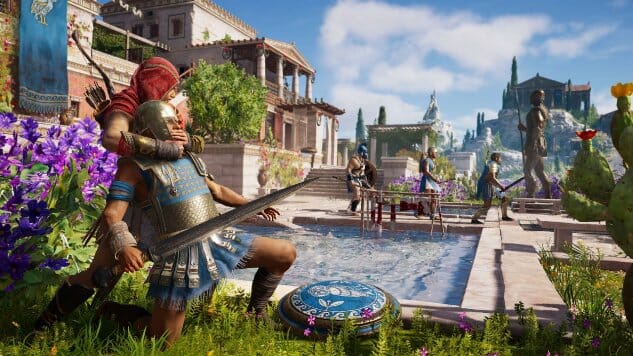This week, the release of Assassin’s Creed Odyssey has brought to surface a debate that arises almost every time a major action game comes out. Are videogames too long? In an oversaturated market with so many titles competing for the audience’s attention at once, the question seems almost quaint. The consumer, after all, wants the most bang for their buck, and many cite the price-to-hours-played of open world games as a point of consideration when buying a new one. If games are expensive, it is thought, then they should at least provide enough entertainment to justify the price. How long should a $60 videogame be?
In the past, as with series like Mega Man, this need to artificially inflate the playing hours of a videogame was achieved through difficulty instead of bulk, in part because consoles of the day couldn’t support the type of game design that would give the player something new to do every few minutes. But now that we can spend hundreds upon hundreds of hours in massive open world spaces, is the content becoming bloated? Take for example, an article making the rounds from Polygon, entitled “Assassin’s Creed Odyssey really picks up after the first 15 hours.” Whether or not you find the first 15 hours of Assassin’s Creed Odyssey enjoyable (as the author did, despite the headline), it certainly puts into perspective the time investment required to play videogames. It took 15 hours for the game to settle into the narrative and gameplay that would come to define the experience. Rarely is that kind of persistence required in any other medium.
It’s this necessary persistence that makes my job as a critic extremely frustrating. There are some games that are bad from the get-go, and I don’t need to invest 40+ hours to figure that out, and other titles that are great and I don’t need to play 40+ hours to confirm it. Very few are redeemed (or ruined) by an eleventh hour twist, and sometimes I resent that I have to deny the natural player instinct to just stop when I feel like it. It’s then that a game can feel “too long,” because there’s so much expectation that I finish it, which I suppose puts me out of touch with the regular consumer.
But that’s the thing, isn’t it? Sometimes the fun or novelty of the action wears off before you can finish the main quest. If you’re invested in the narrative and want to see it through, then a game can absolutely drag. And it’s this combined sense of obligation and curiosity that can become such an obstacle: games are often designed to keep us playing even when our interest has waned. While unfocused game design can be disrespectful of the player’s time, sometimes our attention spans are deliberately manipulated. In that sense, games are absolutely too long, and even exploitative.
But games are also too long because of the shortcuts we take to get there. Whether it’s empty design elements or poor working conditions, corners have to be cut to make us the same big budget titles at the same price year after year. Beyond how our time is used and whether that time had value, there are other points to consider: are these priorities sustainable in the long term? It’s hard to say which came first, the chicken or the egg: players expect a lot for their $60, and publishers continue to up the ante despite stagnating game prices and skyrocketing development costs. It’s great for those who can’t afford to buy a lot of games per year, but now that there are tons of games on the market, no one can keep up. I suspect that’s where some of the sentiment comes from: there was a time where it was possible to play all the major releases each month, but now it’s almost impossible. Games are too long because we can’t play them all.
Ultimately, whether or not you feel a 15 hour warm up is reasonable will depend on how you feel about your leisure time and whether time wasted is well spent. But it’s not unreasonable to ask that if publishers are going to demand our constant attention that they make it count, and also take into consideration the schedules of consumers who are pressed for time. It’s also fair to ask that players stop expecting exorbitant lengths from games, and to reconsider a culture that encourages playing every new game on the market. Yes, games are too long these days, but for more reasons than you think.
Holly Green is the assistant editor of Paste Games and a reporter and semiprofessional photographer. She is also the author of Fry Scores: An Unofficial Guide To Video Game Grub. You can find her work at Gamasutra, Polygon, Unwinnable, and other videogame news publications.
